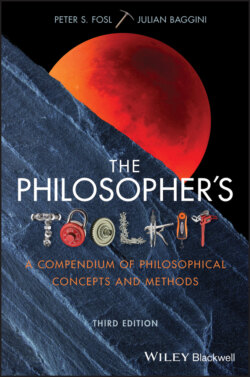Читать книгу The Philosopher's Toolkit - Julian Baggini, Julian Baggini - Страница 87
1.12 Tautologies, self‐contradictions, and the law of non‐contradiction
ОглавлениеTautology and self‐contradiction fall at opposite ends of a spectrum: the former is a sentence that’s necessarily true, and the latter a sentence that’s necessarily false. Despite being in this sense poles apart, they’re actually intimately related.
In common parlance, tautology is a pejorative term used to deride a claim because it purports to be informative but in fact simply repeats the meaning of something already understood. For example, consider: ‘The criminal has broken the law’. This statement might be mocked as a tautology since it tells us nothing about the criminal to say he has broken the law. To be a lawbreaker is precisely what it means to be a criminal.
In logic, however, ‘tautology’ has a more precisely defined meaning. A tautology is a statement that, because of its logical structure, is true in every circumstance – or, as some say, in every possible world. Tautologies are in this sense logical truths or necessary truths. Take, for example:
p or not‐p.
If p is true the statement turns out to be true. But if p is false, the statement still turns out to be true. This is the case for whatever one substitutes for p: ‘today is Monday’, ‘atoms are invisible’, or ‘monkeys make great lasagna’. One can see why tautologies are so poorly regarded. A statement that is true regardless of the truth or falsehood of its components can be considered to be empty; its content does no work.
This is not to say that tautologies are without philosophical value. Understanding tautologies helps one to understand the nature and function of reason and language.
